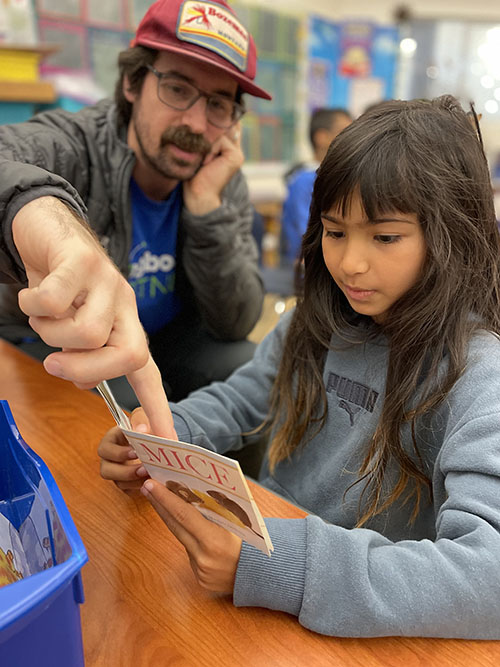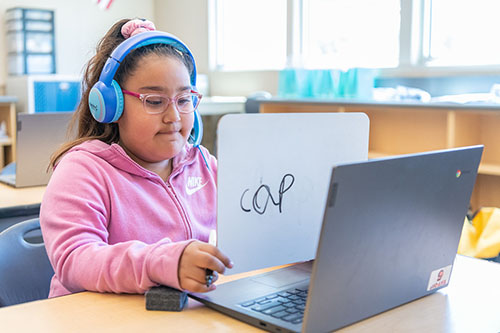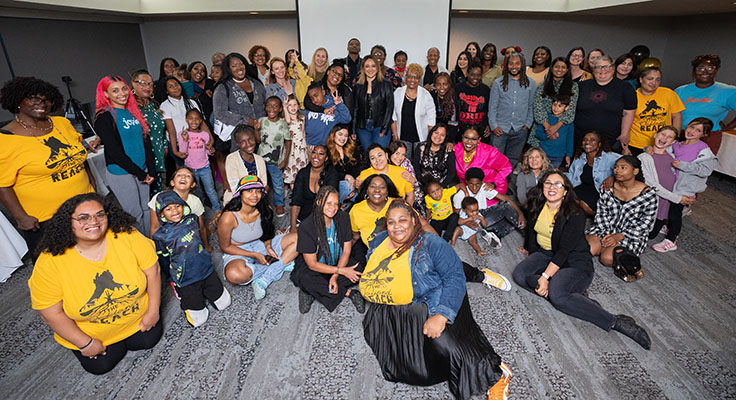By Dana Cilono, Director, Education Strategy & Ventures
Two years ago, I began leading the Education Program at the Kenneth Rainin Foundation. My experience as an educator, instructional coach, nonprofit literacy director and now a funder have helped me understand the context for learning to read in Oakland. Over the past few years, as the result of many efforts, I’ve heard more students boast about their literacy progress, families demand more equitable access to evidence-based instruction and intervention, and educators uplift the benefits and challenges of applying research to practice. I have also seen growing awareness of Oakland’s literacy crisis and momentum building for literacy to be seen as a civil rights issue, which is motivating much needed change.
To assess the Foundation’s early literacy strategies and deepen my understanding, I engaged Informing Change, a strategic consulting firm, to evaluate our Education grantmaking. In this blog I recap their findings and recommendations to achieve our goal of all Oakland children reading at or above grade level by third grade.
Evaluating Our Education Grantmaking
Between 2009 to 2022, the Rainin Foundation provided $40 million through 247 grants to strengthen early literacy education in Oakland. Fifty percent of these grants were awarded to Oakland Unified School District (OUSD) and its schools as well as public charter schools in Oakland. In 2020-21, the Foundation’s Community Strategy Council helped us broaden our strategies to embrace equity and center community knowledge. Last year, guided by our Learning and Evaluation Framework, Informing Change reviewed grantee reports, analyzed external data and interviewed leaders in the Oakland education field to determine:
- if our funding was sufficiently ample to invest across four different priority areas,
- where the Foundation is best positioned to strengthen impact and
- whether our strategies aligned to those of the people powering on-the-ground literacy initiatives.
Four Measures Of Change For Literacy Proficiency
Informing Change used the following key measures of change as necessary for advancing literacy proficiency:
- Families report increased confidence in understanding their child’s literacy development, current abilities and needs.
- Students achieve milestones in key areas of literacy development: oral language, letter knowledge and phonological awareness.
- Educators increase their effectiveness in implementation integrity, progress monitoring and pacing for literacy attainment.
- Strategic Partners (funders, convenings, coalitions) collaborate to map literacy resources in key areas that impact progress.
Findings And Recommendations To Strengthen Our Grantmaking

The assessment revealed some bright spots and areas of progress discussed below. However, overall, the results indicate that current conditions fall short of ensuring literacy proficiency for most third graders in Oakland. Informing Change offers six findings and recommendations to guide the Foundation’s ongoing work.
- Engage families: Programs that develop parent leadership on literacy at the school and help parents and teachers get on the same page about reading expectations positively impact literacy instruction. However, even when family knowledge about literacy increases, clear communication about resources and greater access to dyslexia screenings may be needed to help parents act on that knowledge.
- Explore pathways for supporting literacy interventions: Reading interventions have resulted in progress for some students in some schools, but the results have not scaled district-wide. Continue to explore other pathways for funding literacy interventions beyond the district until sufficient infrastructure is in place.
- Support high-dosage tutoring: Consistent high-dosage tutoring is one of the most effective literacy interventions for students. Look for ways to support tutors’ professional development and promote small group sizes in tutoring sessions, which help remove social stigma and allow for personalized instruction.
- Fund curriculum-agnostic approaches: Rainin Foundation investments led to measurable, tangible improvements in OUSD’s ability to train and coach to literacy, in part by improving professional development opportunities. As a result, teachers’ knowledge about literacy is shifting and attitudes are evolving. Teachers are more likely to embrace changes in their teaching practices when they see the changes as part of a broader set of best practices, rather than as a new trend or branded curriculum.
- Prioritize principal leadership: Consider schools—and their leaders such as their principals—as the unit of change for literacy, rather than the district or individual teachers. A principal who is familiar with literacy research can communicate literacy goals, support teachers and align school schedules and resources to strengthen impact.
- Change the tenor of the conversation: Coalitions and strategic partners are key to supporting the district and holding it accountable to its commitments, building momentum for change and elevating literacy as a priority within the district. Talking about access to literacy proficiency as a civil rights issue—as FULCRUM and the NAACP did, and as The Oakland REACH echoed—sparked changes within the OUSD. Keeping the focus on ensuring equitable access to resources and opportunities in literacy development for all children will be important.

There are many factors that influence student access to resources and opportunities for learning to read. The Rainin Foundation’s contributions are one, among many others, toward strengthening early literacy education. Oakland is rich in the resources and people power needed to raise literacy rates. Schools can be sites of change where principals, family leaders, teacher-coaches, teachers and tutors all work together to make Oakland a city in which every child has the literacy skills to thrive.
We are grateful to Informing Change for their research and insights. The Foundation is deeply appreciative to the individuals whose input was invaluable to this report—we are listening.
What’s Next
We remain open to new and creative solutions to challenges in this work. We are planning to re-engage the Community Strategy Council and will continue talking to our partners and others. Meaningful change can only happen if we are in close partnership with people living and working in the communities we support. The insights we gain help shape our grantmaking and other efforts.
In response to the report’s recommendation to explore other pathways for funding literacy intervention, we are launching Early Care Spaces, a new open application grant program. Funding will be awarded to organizations laying the groundwork for early language and literacy development for Oakland children ages zero to five. This program aims to support learning opportunities for kids, career advancement and upskilling for early care Black providers, and parent and caregiver support for early literacy. We will be sharing the details in early June.
As I continue conversations with grantees and partners, I will follow up with a summary of what we’re learning and share steps the Rainin Foundation is taking to build on the Education Program’s strengths and opportunities. In the meantime, I invite your feedback and questions.

